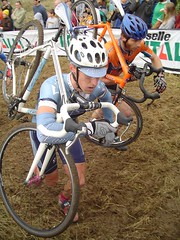[Editor’s note: This is the first contribution from local cyclocross racer and co-owner of Sellwood Cycle, Erik Tonkin (it was actually written a few weeks ago). Stay tuned for more articles and race recaps from him throughout the season.]

These days it seems like the cyclocross season never ends. As crazy as it sounds, I was getting phone calls and emails as early as last March about the ‘cross clinics! “Are you gonna do ‘em again? When do they start? And so on. Everybody can’t wait for cyclocross. Well, the wait is over. Now really is the time for ‘cross, and once again the Alpenrose ‘Cross Clinics have kicked off the season.
Now is the time to lay the groundwork for cyclocross. If you want to work on your running, now is the time. If you want to get some base miles for a heavy race season, now is your last chance. Most important, if you want to work on your ‘cross specific skills, then start now! (Editor’s note: Erik wrote this a few weeks ago, but I am just publishing it now).
There’s a simple reason why ‘cross is popular. (Well, there are lots of reasons, but that’s a topic for another day….) The sport is so new to so many people that improvement comes fast and furious, and that’s very encouraging to an athlete. That girl that always beats you by ten minutes in the MTB XC race might be in for a surprise on the ‘cross course if you’ve honed your dismounts. Or that guy that always out-sprints you on the road might not have a chance because you drop him on the run-ups. And that rider that always—no matter what—always tries to ride the same line, well…you studied the course before the race, found a better line, and on the last lap you took it and the rest was history.

Yeah, ‘cross is fun because its demands are so varied, because a rider has to do so many different things well during a relatively short period of time. Of course, that’s what makes ‘cross hard, too: there are lots of ways to screw up!
Make no mistake, I think ‘cross races are much easier to tackle than, say, cross-country mountain bike races or road races: it’s just a much less grueling event. But ‘cross is still tough, and it can seem impossibly so without some basic, specific skills. These skills are fundamental. Even those of us who have competed in the sport for years take the time each summer to review the basics. Yes, we practice, and we do so—at first, at least—at very slow speeds.

Cyclocross is a lot like skate-skiing or hockey or golf—all these sports require a tremendous amount of thought, skill, coordination, and…you name it. Proper technique of anything is complicated, but an expert will make it look easy, whether it be a chef cooking crepes or a cellist making music. The shared truth, however, is that technique is learned behavior: experts are not born; they are made. We need to be conscious of that when in pursuit of cyclocross glory!
Participating in such a complex sport requires time and attention to detail, but it’s worth it. The payoff can be huge because the workload itself can be so big.
You know the saying that our greatest strengths are also our greatest weaknesses. We all have a tendency to seek shelter in our strengths and, thus, hide from our weaknesses. For me, I know that I rely on my own particular strengths too much on the race course. Sometimes, my weaknesses are all too exposed, and those traits that make me a good racer aren’t enough to carry me through. In fact, at times my strong suits are a heavy burden. I try very hard every year to train my weaknesses, but it’s unpleasant. Nobody likes to suck! But that’s what it takes.

